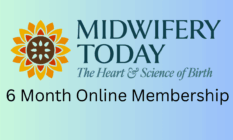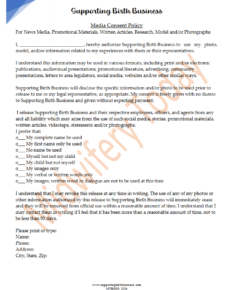
A Keen Eye: An Interview with Verena Schmid
Editor’s note: This article first appeared in Midwifery Today, Issue 62, Summer 2002.
Subscribe to Midwifery Today Magazine
Verena Schmid of Florence, Italy has been assisting with births since 1979. She is founder of Donna e Donna-Il Giornale delle Ostetriche, a midwifery magazine in Italy. When she realized how poor midwifery education was in her country, she started a school to teach midwives with the true sense of embodying the midwifery model of care. In the year 2000 at a homebirth conference in Amsterdam, Verena won the prestigious Astrid Limburg award for midwifery achievement and excellence. She has been invited to teach in hospitals all over Italy. This brilliant, humble midwife is a remarkable teacher, a brilliant thinker and an activist. We can learn a lot from her.
Verena will be teaching at this summer’s Midwifery Today International Intensive. The concept for the intensives is to search the world for the most innovative midwives we know. We then bring these midwives to you for an in-depth learning experience that will directly and deeply help improve your practice. The bottom line is always to help you better serve the women and babies in your care. I feel we have found two “living treasures” this year. Through the 5-day intensive experience you will learn at a whole new level. The side bonus is the wonderful relationships you will forge with other great birth practitioners.
The following is an interview with Verena.
Jan Tritten: Can you talk about your concerns with how modern culture handles birth?
Verena Schmid: Pain is learned by the brain. If I have to help, it is with pain analysis. The medical way of birth steals the experience from women. They need to be conscious about their experience-make it their will to do birth their way.
The most important thing is that women need to learn to follow their instincts. They need to learn to listen to themselves. They need to learn to follow their inner guide. If they do, everything will be OK.
This is hard to do in our culture. It is important to meet with a supportive group of women doing the same things such as natural pregnancy and birth. This is so much safer than techno-pregnancy and birth. Because of the conditioning of technology, the mother needs to work on conditioning for natural birth. She needs strong knowing about her natural resource. If she is supported by a midwife, they can work together on this.
Tapping into her mothering instinct is especially important with the newborn baby. If she doesn’t follow her instinct some failure occurs. Following rationality equals failure. This doesn’t mean we don’t heed science or evidence. I see that women understand this.
JT: You are known among European midwives for your keen powers of observation. What do you look for and how do you teach this skill to other midwives?
VS: There are three essential elements or areas I look at. First, pay attention to the body. This is a physiological process. I teach midwives to search for signs of health, not pathology. Second, I look at behavior, environment and setting of the woman. Is she active or passive? Sure of herself or tentative? Closed personality or open? How is the rhythm of her life? Who is with her? Does she have support? Finally, I look at her emotional relationships. What she feels, the kinds of relationships she has, what the father of the baby, her own mom and her friends are like.
I teach midwives there are three important points to observe if a woman is healthy.
1. Dynamic of involuntary nervous system-I try to determine how she is thinking and moving. I also look at para-sympathetic activities-resting, sleeping and her ability to relax. Every system produces different hormones. I teach midwives to try and determine which kind of hormones the mom produces. It can help if you know how they manifest in the body. Balance is important.
2. Dynamic and communication in the hormonal system. Pay attention to the mom’s emotional and physical states. Good dynamics in the body are important. The hormones give information to other systems of the body. Women can listen to this. If hormones don’t work there can be problems with the placenta.
3. Good dynamic and communication with her baby. You see-it is all communication of the systems.
JT: What are your thoughts on prenatal care?
VS: Prenatal care creates better birth. Pregnancy patterns have the same rhythm as stages of labor. The first trimester patterns the first stage of labor. Many Europeans mark three stages within birth calling what we call second stage third stage.
During pregnancy if the mom is open to these rhythms she will be able to do labor. This doesn’t necessarily mean if she had a difficult first trimester it will lead to problems in the first or prodromal stage, but it opens her to the importance of being pregnant in a conscious way. First trimester and first stage, the mom learns to create an inner space for the baby. This first part of birth is to prepare to open up. Second trimester and second stage are both about learning to open up, opening up to the baby and opening the cervix. Third trimester and third stage are about learning to let baby go and let the baby be born.
Once the baby is born the stages begin again. The baby adapts to mom and to life and mother adapts to baby and motherhood. Then there are three to six months of harmony-the goal of motherbaby. Breastfeeding established. Finally there are six to nine months when baby is more outward and wants to be individual. Mother begins to let go. If you do really good prenatal care a woman can give birth alone.
JT: What do women want?
VS: Continuity of care.
JT: What do you offer women?
VS: We offer choice. We help them to make decisions. It takes time and we give them freedom and respect for their choices. We give holistic or global care, seeing the whole person in aspects of herself. Women want someone who listens to them. They want to be protected. Their biggest fear is to be cut or to tear-not the tear itself, but losing their integrity. This what they are afraid of. The fear is really of the perceived violence in birth and pregnancy. Women today have gone to a doctor every time something has gone wrong. They don’t know other ways.
JT: What do you do?
VS: We promote health. Prenatal health especially is the root of the relationship between mother and baby and of breastfeeding. In Italy most don’t breastfeed, but we don’t have prenatal care in mind. If women have a good pregnancy the baby cries less. With a bad pregnancy the baby cries more. The prenatal period lays the whole foundation of the motherbaby relationship. This relationship is complex, all at once a concept and a relationship outside our body that we have also had inside of our body. Midwives need to be conscious of the woman’s balance as well as how to restore her own personal balance.
Learn more from this original thinking midwife and agent of birth change through our international intensives program in August 2002. Verena will help to dramatically improve your care for and understanding of pregnant women.

 Jan Tritten is the founder, editor, and mother of Midwifery Today magazine and conferences. Her love for and study of midwifery sprang from the beautiful homebirth of her second daughter—after a disappointing, medicalized first birth in the hospital. After giving birth at home, she kept studying birth books because, “she thought there was something more here.” She became a homebirth midwife in 1977 and continued helping moms who wanted a better birth experience. Jan started Midwifery Today in 1986 to spread the good word about midwifery care, using her experience to guide editorial and conferences. Her mission is to make loving midwifery care the norm for birthing women and their babies in the United States and around the world. Meet Jan at our
Jan Tritten is the founder, editor, and mother of Midwifery Today magazine and conferences. Her love for and study of midwifery sprang from the beautiful homebirth of her second daughter—after a disappointing, medicalized first birth in the hospital. After giving birth at home, she kept studying birth books because, “she thought there was something more here.” She became a homebirth midwife in 1977 and continued helping moms who wanted a better birth experience. Jan started Midwifery Today in 1986 to spread the good word about midwifery care, using her experience to guide editorial and conferences. Her mission is to make loving midwifery care the norm for birthing women and their babies in the United States and around the world. Meet Jan at our 



















